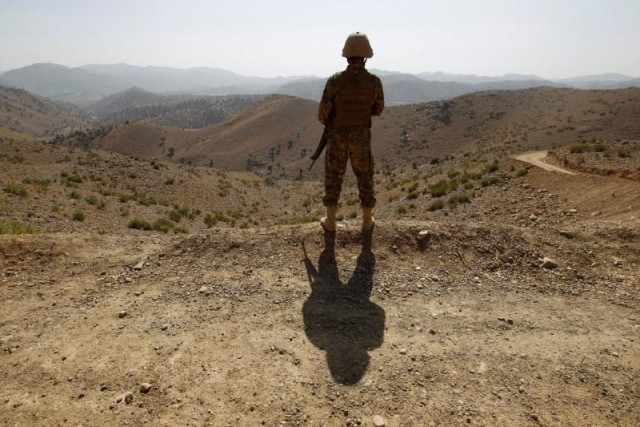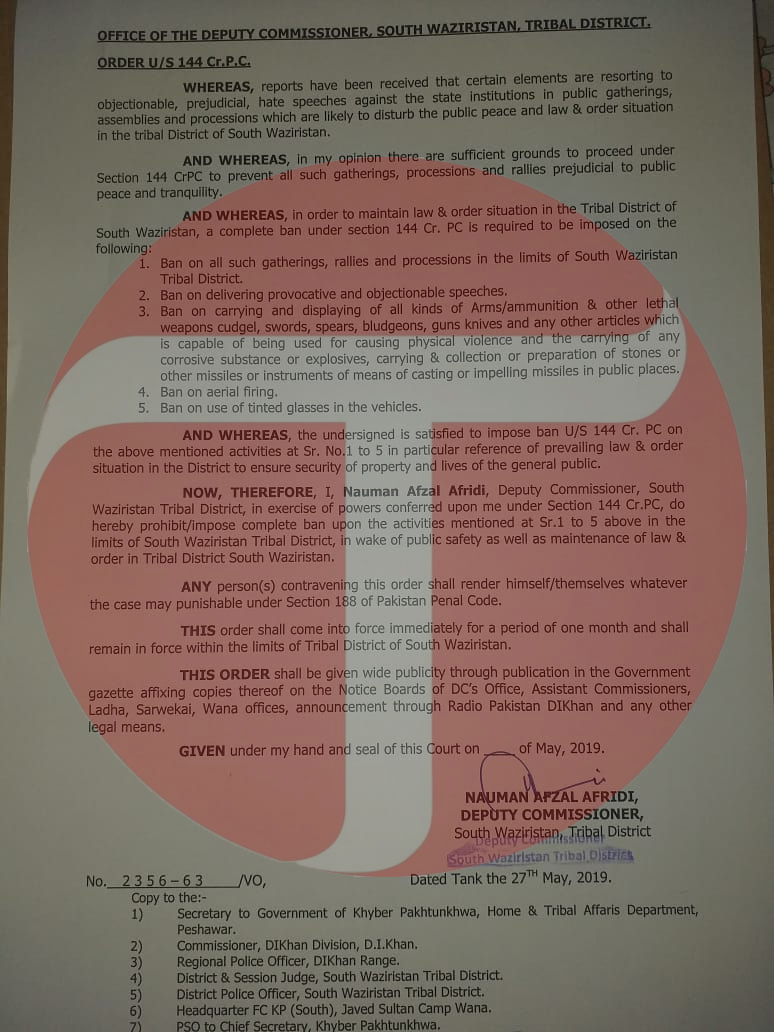Section 144 imposed in South Waziristan
DC bans public gatherings, rallies, processions to "maintain law and order"

A soldier stands guard outside the Kitton outpost along the border fence on the border with Afghanistan in North Waziristan, Pakistan October 18, 2017. PHOTO: REUTERS
Deputy Commissioner South Waziristan Nauman Afzal Afridi issued a notification imposing Section 144 of the Code of Criminal Procedure (CrPC).
The move also prohibits delivering “provocative and objectionable speeches”, carrying and displaying of all kinds of arms and ammunition and other lethal weapons, aerial firing, and use of tinted glasses on vehicles.
“Any person(s) contravening this order shall render himself/ themselves whatever the case may punishable under Section 188 of the Pakistan Penal Code (PPC),” added the notification.
The move comes following tensions in North Waziristan after a clash occurred between security officials and protesters led by lawmakers Mohsin Javed Dawar and Ali Wazir at the Khar Kamar check post in Boya.
 Soldier martyred in terrorist attack on Makki Garh post
Soldier martyred in terrorist attack on Makki Garh postSection 144 of the CrPC
CHAPTER XI - TEMPORARY ORDERS IN URGENT CASES OF NUISANCE OR APPREHENDED DANGER 144.
Power to issue order absolute at once in urgent cases of nuisance or apprehended danger. in cases where, in the opinion of a District Magistrate, Sub-Divisional Magistrate, (or of any other Executive Magistrate] specially empowered by the Provincial Government or the District Magistrate to act under this section, there is sufficient ground for proceeding under this section and immediate prevention or speedy remedy is desirable, such Magistrate may, by a written order stating the material facts of the case and served in manner provided by section 134, direct any person to abstain from a certain act or to take certain order with certain property in his possession or under his management, if such Magistrate considers that such direction is likely to prevent, or tends to prevent, obstruction, annoyance or injury, or risk of obstruction, annoyance or injury to any person lawfully employed, or danger to human life, health or safety, or a disturbance of the public tranquility, or a riot, or an affray.
(2) An order under this section may. in cases of emergency or in cases where the circumstances do not admit of the serving in due time of a notice upon the person against whom the order is directed, be passed, exparte.
(3) An order under this section may be directed to a particular individual, or to the public generally when frequenting or visiting a particular place.
(4) Any Magistrate may, either on his own motion or on the application of any person aggrieved, rescind or alter any order made under this section by himself or by his predecessor in office.
(5) Where such an application is received, the Magistrate shall afford to the applicant an early opportunity of appearing before him either in person or by pleader and showing cause against the order; and, if the Magistrate rejects the application wholly or in part, he shall record in writing his reasons for so doing.
(6) No order under this section shall remain in force for more than two months from the making thereof, unless, in cases of danger to human life, health or safety, or a likelihood of a riot or an affray, the Provincial Government, by notification in the official Gazette, otherwise directs.
Group, led by MNAs Ali Wazir and Mohsin Javed, assaults military check post in North Waziristan: ISPR
Section 188 of the PPC
Disobedience to order duly promulgated by public servant: Whoever, knowing that, by an order promulgated by a public servant lawfully empowered to promulgate such order, he is directed to abstain from a certain act, or to take certain order with certain property in his possession or under his management, disobeys such direction, shall, if such disobedience causes or tends to cause obstruction, annoyance or injury or risk of obstruction, annoyance or injury, to any persons lawfully employed, be punished with simple imprisonment for a term which may extend to one month or with fine which may extend to two hundred rupees, or with both; and if such disobedience causes or tends to cause danger to human' life, health or safety, or causes or tends to cause a riot or affray, shall be punished with imprisonment of either description for a term which may extend to six months, or with fine which may extend to one thousand rupees, or with both.
Explanation: It is not necessary that the offender should intend to produce harm, or contemplate his disobedience as likely to produce harm. It is sufficient that he knows of the order which he disobeys, and that his disobedience produces, or is likely to produce harm.
Illustration: An order is promulgated by a public servant lawfully empowered to promulgate such order, directing that a religious procession shall not pass down a certain street. A knowingly disobeys the order and thereby causes danger of riot. A has committed the offence defined in the section.


1724319076-0/Untitled-design-(5)1724319076-0-208x130.webp)
















COMMENTS
Comments are moderated and generally will be posted if they are on-topic and not abusive.
For more information, please see our Comments FAQ